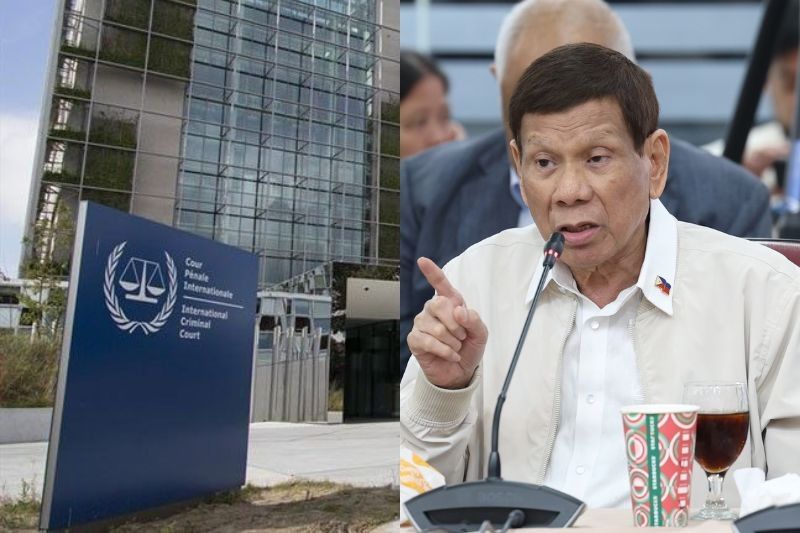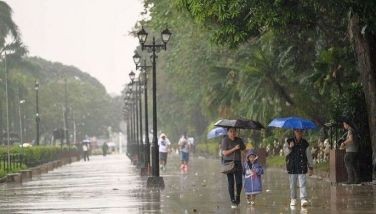Fact check: Has the ICC actually sent anyone to prison?

MANILA, Philippines — The International Criminal Court has convicted and imprisoned individuals found guilty of war crimes and crimes against humanity.
This is contrary to former President Rodrigo Duterte’s claim that the tribunal has only made demands and has not sent anyone to prison.
CLAIM: Duterte said the ICC has not taken any action against anyone and has not imprisoned anyone.
RATING: This is false.
--
FACTS:
What he said
During the House Quad Committee’s eleventh hearing into the war on drugs on Wednesday, November 13, Rep. Lordan Suan (Cagayan De Oro, 1st District) questioned Duterte’s 2018 decision to withdraw the Philippines from the Rome Statute.
At the 3:04:15 to 3:04:42 mark of the livestream’s second part, Duterte responded that the withdrawal “has nothing to do with the drug war,” remarking that the ICC’s efforts and trials yield no results, as no one has been imprisoned.
Duterte said:
Hindi, it has nothing to do with the drug war. … Walang ginawa ‘yan [ICC]. Wala namang nakulong. Wala naman… basta puro demanda ‘yan. (No, it has nothing to do with the drug war. ... It has [ICC] done nothing. No one was imprisoned. Nothing... It’s all just filing cases.)
While arguing that the Philippines’ withdrawal was unrelated to his war on drugs, which led to thousands of extrajudicial killings, Duterte spent around three minutes insisting he would not submit to a foreign court or its jurisdiction.
“I will not allow a foreigner to judge me for the things that I have to do during my time as president of this Republic,” he said. “Hindi ako magsurrender ng foreign court, Sir. Never. I will not allow myself to be placed under jurisdiction of any court.”
What he left out
The ICC has actually convicted individuals and sentenced them to prison. According to the international tribunal’s website, four cases have resulted in prison sentences.
In March 2014, Congolese rebel leader Germain Katanga was found guilty by ICC Trial Chamber II as an accessory to a crime against humanity, specifically murder, following the attack on the village of Bogoro in the Democratic Republic of Congo (DRC) on February 24, 2003.
Katanga was also charged with four counts of war crimes, including murder, attacking a civilian population, pillaging and destroying property. He was sentenced to 12 years in prison in May 2014, with nearly seven years deducted for his time spent at the ICC detention center.
In another case, Islamist militant Ahmad Al Faqi Al Mahdi, reportedly a member of the Mali-based armed group Ansar Dine, was sentenced to nine years in prison in September 2016. This sentence was reduced by the two years he had spent at the ICC detention center.
In August 2018, he was relocated to a prison in Scotland, United Kingdom, to fulfill his sentence. Al Mahdi was convicted for aiding in the destruction of historic and religious monuments, including nine mausoleums and a mosque in Timbuktu, Mali, during attacks in June and July 2012.
Meanwhile, Thomas Lubanga Dyilo, former president of political and Ituri-based militia group Union des Patriotes Congolais/Forces Patriotiques pour la Libération du Congo, was also declared guilty in March 2012 as a co-perpetrator of war crimes.
In July 2012, ICC Trial Chamber I sentenced Dylio to 14 years in prison for recruiting children under the age of 15 to actively participate in hostilities from 2002 to 2003. He served his sentence at a prison facility in DRC starting December 2015.
The fourth case involved five individuals who committed crimes against humanity, including murder and rape, during the armed conflict in the Central African Republic from October 26, 2002, to March 15, 2003.
ICC Trial Chamber VII determined that the offenses included obstructing justice and falsifying testimonies from defense witnesses.
The accused received sentences ranging from six months to 30 months in prison. Former DRC Vice President Jean-Pierre Bemba Gombo was also fined EUR 300,000 (~P18.6 million), while his defense lawyer Aimé Kilolo Musamba was fined EUR 30,000 (P1.86 million).
These convicted individuals were detained at the ICC while the trials were ongoing and were imprisoned once the verdicts and sentences were issued, contrary to Duterte's statement.
Essential context
The ICC has been examining Duterte’s war on drugs and its associated extrajudicial killings since 2017, prior to the Philippines’ withdrawal in 2018. The court has since been collecting documents and interviewing individuals involved in the drug war.
Under Article 127 of the Rome Statute, withdrawal takes effect one year after the United Nations receives the notification, making the Philippines' withdrawal official in March 2019.
The same provision also indicates that the ICC retains jurisdiction over crimes committed while the Philippines was still a member state.
RELATED: Fact check: Philippines has obligations despite leaving ICC in 2019
While Duterte stated that the Philippines' withdrawal from the ICC was unrelated to the drug war, the letter that his administration submitted to UN Secretary-General Antonio Guterres described the decision as a “principled stand against those who politicize and weaponize human rights.”
According to the ICC’s request for authorization to investigate the Philippines, the Prosecutor estimates that between 12,000 and 30,000 extrajudicial killings may have occurred from July 2016 to March 2019 alone.
Since Duterte dared the ICC on Wednesday to investigate his drug war, the Marcos administration announced that they will not stop him from surrendering himself to the tribunal.
Why we fact-checked this
The Philippine government has launched its own congressional probe into Duterte’s war on drugs for the first time.
It was the House of Representatives that conducted the first inquiry into the extrajudicial killings under the Committee on Human Rights, while the illegal drug trade was probed by the Committee on Dangerous Drugs.
On August 7, the Quad Committee was made after the House Resolution 1880 was passed. It is composed of the two aforementioned committees, as well as Committees on Public Order and Safety and Public Accounts.
The first hearing of the mega panel was held on August 16. Since then, several resource persons have come forward to testify before lawmakers of their respective involvement in crimes committed during the war on drugs.
There was Duterte’s notorious narco list when he was president, which led to the extrajudicial killings of public officials merely suspected of links to illegal drugs, denying them due process.
There was also the killing of three alleged Chinese drug lords in 2016, which a prison warden later revealed Duterte had praised him for.
One of the biggest revelations was the alleged reward system that incentivized police officers in the nationwide drug war, confessed by a Duterte-appointee.
At the eleventh hearing, where Duterte first appeared, he had confirmed some of the allegations, such as monetary funds and compensation for anti-illegal drug operations.
For these reasons, including his admission of responsibility for the consequences of the drug war, lawmakers have found Duterte potentially liable for crimes against humanity under Republic Act 9851.
- Latest
- Trending






























